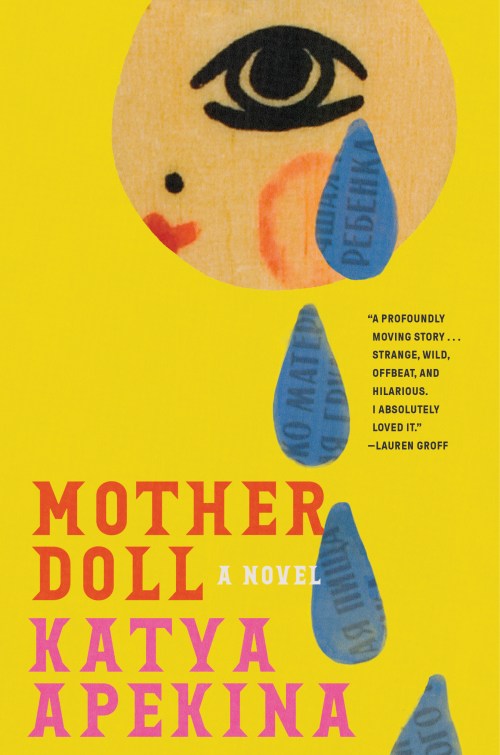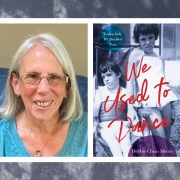[ad_1]
I first fell in love with Katya Apekina’s writing a decade ago, when I read her short story about a girl who loses her best friend to the convent. It was humorous and immersive, yet despite the humor, it elicited a depth of feeling that has stayed with me for many years. I have since found Apekina’s signature is to use the humorous and strange to examine complicated and powerful relationships, which echo through my mind long after her stories end.
In her newest novel, Mother Doll, a Russian revolutionary finds an unlikely means of haunting her American great-granddaughter. Zhenia is adrift in present-day LA, pregnant with a child that her husband doesn’t want. When she gets a call from a medium who says he’s been contacted by her long-dead great-grandmother, Zhenia is thrown back into her family’s history and the history of Russia as she learns about her great-grandmother’s heroic and horrific deeds during the Russian Revolution. The book interweaves the lives of four generations of women, offering a funny yet thoughtful meditation on trauma and inheritance, what we can escape in our family’s history, and what we are destined to repeat.
Apekina was born in Russia to Jewish-artist parents and immigrated to the U.S. when she was four. Her mother and grandmother staged a hunger strike in order to be let out. Over email, we discussed this personal history, as well as writing, trauma, and living in the shadow of brilliant forebears.
This interview has been edited for length and clarity.

Emily Robbins
There is a lot in your own family’s history mirrored in Mother Doll. Could you say a little bit about your family’s experience in Russia, and what sparked the idea for this book?
Katya Apekina
I tend not to write autobiographical fiction, but there are definitely some points of intersection! Like the protagonist Zhenia, I immigrated to the U.S. from Russia when I was little. I came to Boston with my mom and her parents—my dad came later. My grandparents and mom had applied to leave and were waiting for many years. They were “refuseniks,” the term for people who had wanted to immigrate and weren’t allowed. It was a status that put them in limbo. They were opposed to the Soviet regime and had been fired from their jobs as marine biologists. My grandfather was dying and needed heart surgery, so they had to go on a hunger strike to finally be allowed out.
I remember growing up in Boston rolling my eyes at the college essays about the trauma of immigration some of my friends were writing. I was so dismissive of it. It seemed like a cynical ploy to get into college. It wasn’t something we talked about at home. It was a topic that wasn’t off-limits, exactly, but it was painful and nobody wanted to rehash it. When I had a child of my own and she was the age I was when I came to the U.S, I started processing what had happened to me. Of course, it was trauma! And seeing her at the same age I was then, it helped me understand it all in a new way. I think this is also what’s happening for Zhenia—a lot of these revelations are triggered by her pregnancy.
Emily Robbins
Along those same lines, your grandmother wrote a memoir before she died of life in post-revolution Russia. It was a memoir she wrote for her grandchildren and yet you never read it until after her death. Your reflections on this—your grandmother’s words and your reaction to them—became an essay for the LA Review of Books. Can you say a little about this—both the reading and the writing in the margins of your grandmother’s words?
Katya Apekina
My grandmother learned to type on a computer so she could type up these memoirs and so I could read them. Then I didn’t read them until after she died. I had them sitting on my computer for years. I was curious about her life, but I could not bring myself to open the file. There was just a sense of dread or resistance around it. The night of her funeral I started reading them. I started translating them so that my daughter would be able to read them some day. In that process, I started annotating them and feeling like I was having a conversation with her.
The memoirs were post post-revolutionary. She was a teenager during World War II, living in Poland. Her family was killed, she was all alone, on foot, and escaped to safety in Russia. This was the excerpt that I translated for LARB. The rest of her memoirs were strange—the things she did talk about, the things she left out. I had a lot of questions, which I could only ask in the margins. There was a general sense of alarm and danger that she projected onto innocuous things. There were a lot of omissions. When I reflected later on why I had put off reading them, the only thing I could think was that I was worried that by reading them I would have to carry her story. The burden seemed like it would be unbearable.Then, of course, it became clear once I read them that it was a burden I was already carrying, but which had until then remained unnamed. Once I could really understand her story, it actually made it much easier for me to separate from it. I began to think about what anxiety was my own vs. what anxiety was inherited.
Emily Robbins
In Mother Doll, Zhenia’s grandmother dies without saying goodbye. But when your own grandparents died, they left a lot of last words, specifically for you—your grandmother’s memoir and your grandfather’s monologues from his deathbed, which you recorded. What was it like to receive your grandparents’ words and to engage with them? Did it teach you anything about death?
Katya Apekina
I was with my grandfather in his last days. I naively thought when people were old they were “ready,” whatever that meant. But he was not ready, he kept saying that he wasn’t ready because he had too many unfinished projects. I was recording his memoirs he was dictating to me about his childhood. It felt exhausting to receive the story. I wanted him to see me. I wanted a dialogue. But that is not what was happening—I was there to take and carry his story. He told me, at one point, his creative dreams and aspirations had not been realized and he wanted me to realize them—to take from him, from his life or his story, however I saw fit. He wanted me to use it in my own work as raw material. I find this so moving.
Emily Robbins
In the recordings, your grandfather speaks of how much he wants to keep living and is not ready to die. He also criticizes you. What do you do with the imperfections of a dying person and their fear of death? What was it like for you to engage with this?
Katya Apekina
It was hard. I didn’t think he was dying. I mean not so immediately. He stood up at one point and fainted and I caught him. That was scary. He looked at things in this half dream state—that also scared me. Neither of us were ready for him to die. Many months later, I was complaining to someone that I hadn’t felt his presence, that he hadn’t come to visit me, and then that night I had a dream. I heard him say my name, very close in my ear. I immediately woke up. I was afraid. I wasn’t ready for this either, even though I said I wanted it.
Emily Robbins
One of the things I loved about this book was its description of protests: how moved and exhilarated young Irina feels on the cusp of revolution in Russia. Your first book, The Deeper the Water, the Uglier the Fish, also touched on activism. It also depicts noble and high-minded people having trouble being generous with their own family, especially their own children. In each of these books, a daughter is sacrificed for a cause, though in two very different circumstances and ways. I wondered where that interest in depicting both the excitement, as well as the darkness and difficulties, of activism originates.
Katya Apekina
I think having strong, exciting, and all-encompassing interests brings you out into the world, no matter what they are, and can create a conflict with parenting. I often feel guilty because I’m not very present when I am fully absorbed in my writing. I don’t just mean at the time of the actual writing, but in the inbetween times of just thinking. It’s hard to be so deep into something and then have to come back to your own life. It’s a balance.
For activism specifically, sometimes it means taking a stand and facing the fallout. And kids face it too. When my grandparents refused to join the party, it created a lot of difficulties for them. It limited them professionally, etc. But any other option was unimaginable. From how they’ve talked about it, there were a lot of people turning on other people to survive in the Soviet Union. It was built on these betrayals. They wanted no part of it.
Emily Robbins
A wonderful twist in Mother Doll is Zhenia’s sense of fulfillment. Although, in so many ways, it seems Zhenia’s life isn’t conducive to motherhood (she’s single, has no job or money or benefits, and carries a history of complicated filial relationships) yet motherhood is what fulfills Zhenia in the end. What prompted the book’s third act?
Katya Apekina
The narratives around motherhood are often so martyr-centric and boring, but that isn’t how I’ve experienced motherhood at all. For Zhenia, having a child prompts her to grow up. I don’t mean that having a child has to make a person grow up, or that not having a child means that a person never grows up, but it does in Zhenia’s case and it’s part of her self-actualization.
Emily Robbins
In contrast, Zhenia’s great-grandmother, Irina, abandons her young child to survive in revolutionary Russia. Would you argue that circumstance determines whether a woman can be a “good” mother? Or is there such a thing as a good mother? What questions or ideas about mothers and motherhood guided your writing in this book?
Katya Apekina
Irina feels a lot of shame and guilt for abandoning Vera—she has not been able to forgive herself for this—and she won’t give herself even the grace of admitting this and feeling the grief. When I thought about writing Irina, I thought about the way things can move below the surface and you can feel it even if you can’t see it. Her sorrow and shame was strong enough that it kept her in this afterlife purgatory. As for your question about being a good mother, I don’t know. We do our best, presumably. There’s the concept of the “good enough” mother, and that seems more manageable. Vera, Zhenia’s grandmother, was not a good mother, but she tried to make up for it by being a good grandmother.
Emily Robbins
We began with your grandparents and I really want to return to them at the end. I heard a story that, when you were in high school, your grandmother gave you money to get a nose job. Instead, you used the money to visit Russia and walk in the places your grandmother once lived. Is this true? What do you make of that exchange—the older generation’s focus on beauty and your focus on story and history? In your family, and maybe in Russian-Jewish families in general, where do the ideals of the young and old meet?
Katya Apekina
That would be a good story! But it’s kind of conflating unrelated things. My grandparents did take me to Russia and they did give me money for a nose job, or like a quarter of a nose job. I had never expressed any desire for a nose job. This was an unsolicited suggestion. My grandmother (this is not the same one who left the memoirs) asked me, “Wouldn’t you like to know what it’s like to be beautiful?” Is that generational? I’m not sure. I think they were very eager to marry me off and they thought my nose was standing in the way. This guy I was dating fixed their printer and they were like “He’s the one.” I was 19 and he was definitely not the one. Their gifts often felt barbed. Petting with one hand, slapping with the other. But going to Russia with them, it’s the only time I’ve been back, and it was a real treat. It was a very significant trip. It was so strange to meet relatives for the first time and feel an immediate connection with them. It was a very moving experience seeing the country through their eyes—completely different than the country they’d left back in the 80’s.
Emily Robbins
These are also themes in Mother Doll: materiality, inheritance, and diverging values. Irina, who came of age during the Russian Revolution, often excoriates her great-granddaughter Zhenia for being soft and indecisive. Zhenia, on the other hand, is horrified at atrocities Irina committed when she was young. I know that trauma, passed down through generations, was on your mind while writing.
Katya Apekina
Yeah. I thought about that a lot. Someone once told me about the burden she experienced of having such interesting parents, how she was maybe never able to fully form or grow in their shadow. It’s not exactly the same thing, but people who live big lives often have kids who had to grow up in the negative space.

FICTION
by Katya Apekina
Overlook Press
Published on March 12, 2024

[ad_2]
Source link

